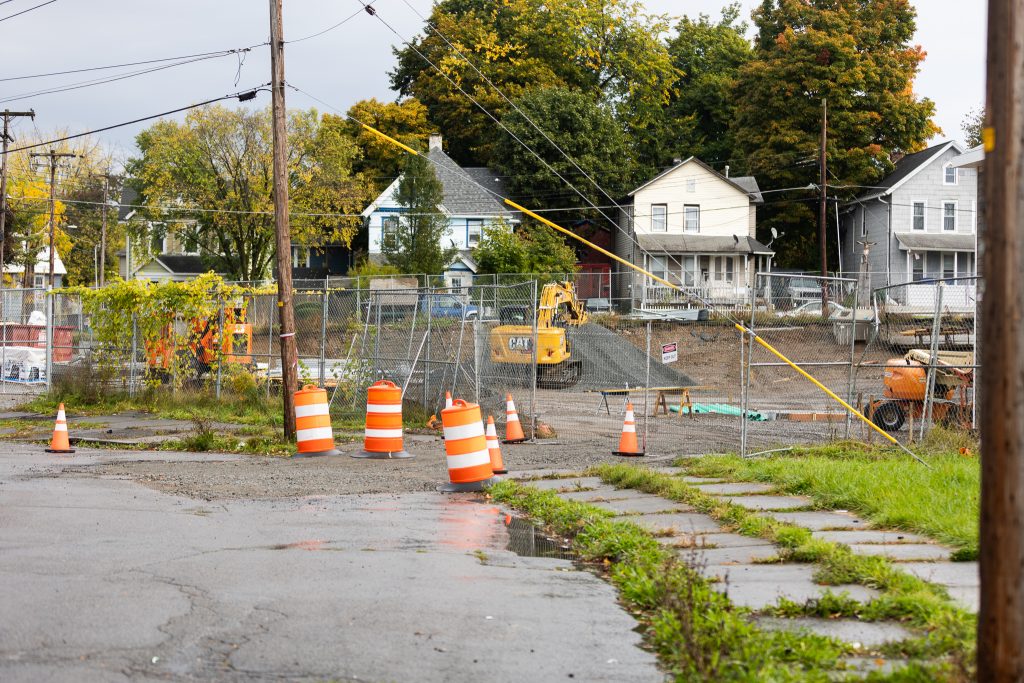A long-awaited project to assist Binghamton veterans has been approved by New York state and is under development.
Located at 530 State St. in the city’s North Side, the $12.2 million project will produce five single units and five double units that are fully furnished and ADA-accessible, meaning that disabled individuals will have equitable access to the same services, resources, programs and areas as individuals without disabilities. The tiny homes — first of their kind in Broome County — will be two different sizes, with the smaller and larger homes totaling 831 and 965 square feet respectively.
Alongside the units, a core component of the project is the development of a two-story, 13,000 square feet Veterans Resource Center, a community space where veterans can receive food, educational and fellowship opportunities and spend time in a community garden. This space is being constructed to serve more than 10,000 veterans residing in Broome County.
“The central feature of the project consist[s] of a Veteran’s Resource Center where my agency, the Broome County Veteran’s Service Agency, along with the [Southern Tier] Veterans Support Group, and ClearPathForVeterans will cohabitate,” Brian Vojtisek, Broome County’s veterans director, wrote in an email. “In addition, the plan is to include building ten housing units, five singles and five doubles. This will provide safe, permanent residences for veterans who are on the verge of homelessness or lack stable housing.”
Tiny homes offer several advantages, like increased flexibility and mobility. Most tiny homes are also environmentally friendly — they have a smaller carbon footprint compared to the average home because they are built with sustainable materials, create less waste and consume fewer resources.
One of the most notable benefits of tiny home living is that they are significantly more affordable and cost-effective than traditional homes, which in the United States cost on average around $412,300. The average cost of a tiny home is between $30,000 and $60,000.
“One of the challenges facing some veterans is finding affordable housing,” Paul Stroud, Binghamton University’s director of veteran and military services, wrote in an email. “This project helps meet that challenge and will benefit the men and women who have faithfully served this country.”
Soldier On, a Massachusetts-based nonprofit organization committed to ending veteran homelessness, will be offering property and case management services at the site. Case managers will develop individualized service plans that accommodates the needs and goals of each veteran.
“Soldier On is thrilled to have been selected by Broome County to provide supportive services for the veterans who will live in the 10 tiny homes at the, soon to be completed, Veteran Resource Center in Binghamton,” Bruce Buckley, the organization’s chief executive officer, wrote in an email.
On top of offering opportunities for skill-building, Soldier On incorporates full-time psychologists into their programs to aid veterans struggling with mental health. Veterans and service members often face mental health challenges including post-traumatic stress disorder, substance use disorder and depression. Research suggests that when part of an interprofessional treatment team, psychologists and psychiatrists can play key roles in providing or guiding comprehensive and effective treatment for veterans.
Despite several years of delays and an initial lack of funding, the project has received support from many community members, political representatives and state officials, including Broome County Executive Jason Garnar, State Sen. Lea Webb and Mayor Jared Kraham. The project is expected to be completed by the summer of 2025.
“Soldier On’s long history of working with veterans in supported, permanent housing communities, coupled with Broome County’s investment in ending veteran homelessness, will provide a tangible path for veterans to attain permanent housing and most importantly, a promising future,” Buckley wrote. “We look forward to beginning this work and partnering with the many committed agencies and individuals in Broome County and put an end to veteran homelessness.”



